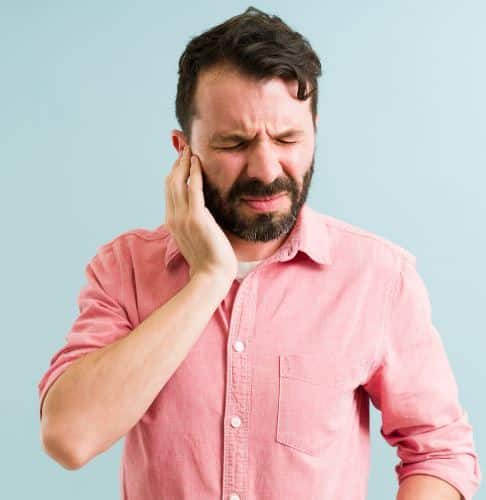‘You are what you eat’ – a phrase often echoed in conversations about health and well-being. Although we understand its significance in shaping our overall health, one aspect often overlooked is its profound impact on hearing. While diets are typically associated with weight management, cardiovascular health, and diabetes, their role in preserving and even enhancing hearing health deserves closer attention.
What we consume can play a crucial role in maintaining optimal auditory function, making diet a vital factor in our overall wellness journey.
The Science Behind Diet and Hearing Loss
Hearing loss, affecting millions worldwide, is commonly associated with aging, noise exposure, and genetic factors. However, research studies indicate that diet and nutrition also play critical roles in the health of our auditory system.
The literature on diet and hearing in humans has been reviewed in detail by researchers like Spankovich and Le Prell (2013) and Spankovich (2015). The relationship between food intake and hearing changes is of practical interest, as dietary changes can be made that might delay or even prevent the development of hearing loss.
A scoping review by Rodrigo et al. (2021) analyzed studies evaluating the composition of the diet in humans and how it relates to hearing loss diagnosed through objective audiometric tests. The review included 22 studies published between 2010 and 2019. It found that diets rich in saturated fats and cholesterol have deleterious effects on hearing that could be prevented by lower consumption. Conversely, greater consumption of fruits, vegetables, polyunsaturated fatty acids (omega 3), and antioxidants in the form of vitamins A, C, and E, may prevent the development of age-related hearing loss (ARHL).

Research has also recently pointed to vitamin D deficiency as a potential contributor to vertigo and hearing loss symptoms, highlighting the importance of adequate vitamin D levels for maintaining auditory health. A 2023 study by researchers in Korea found a 70% risk of vertigo recurrence for those severely deficient in vitamin D and only a 22% chance of recurrence for those with normal vitamin D levels.
Nutrients and Their Impact on Hearing Health
Vitamins and Minerals:
- Vitamin A: Essential for maintaining the health of the inner ear, vitamin A deficiency has been linked to hearing loss. Foods rich in vitamin A include carrots, sweet potatoes, and spinach. Studies have shown that increased serum levels of retinol and pro-vitamin A carotenoids are associated with decreased prevalence of hearing impairment in older individuals (Michikawa et al., 2009; Gopinath et al., 2011).
- Vitamin C and E: Both vitamins are powerful antioxidants. Studies suggest that these vitamins can reduce the risk of noise-induced hearing loss when taken in conjunction with other antioxidants. Citrus fruits, almonds, and sunflower seeds are excellent sources. Some cross-sectional data suggest a positive relationship between vitamin C intake and hearing sensitivity (Spankovich et al., 2011).
- Magnesium: Found in bananas, avocados, and spinach, magnesium helps protect against noise-induced hearing loss by improving blood flow to the inner ear and mitigating the effects of loud noise exposure. Cross-sectional data suggest a positive relationship between magnesium intake and hearing sensitivity (Spankovich et al., 2011).
- Zinc: Important for the immune system, zinc can also help prevent age-related hearing loss. Foods such as oysters, beef, and pumpkin seeds are high in zinc.
- Folate : Also called folic acid or vitamin B9, found in leafy greens, legumes, and citrus fruits, is associated with a reduced risk of hearing loss by lowering homocysteine levels, which can impair blood flow to the inner ear if elevated. Studies indicate that low intakes of folates and vitamin B12, along with decreased serum concentrations, are associated with impaired hearing. Folate supplementation has been shown to slow age-related decline in hearing acuity (Houston, Johnson, & Nozza, 1999; Durga et al., 2007).
A systematic review with meta-analysis indicated a protective effect on hearing loss due to higher intake of carotenoids, vitamins A, C, E, and folate. Five studies involving approximately 100,549 participants showed that higher dietary intake of these vitamins and antioxidants was inversely associated with the risk of developing hearing loss (Ghosn, Azadbakht, Esmaeilpour, & Esmaillzadeh, 2024).

Antioxidants and Anti-inflammatory Foods
Oxidative stress and inflammation significantly contribute to age-related hearing loss. Diets rich in antioxidants can help mitigate these harmful processes. Foods high in antioxidants, such as berries, nuts, and leafy greens, reduce oxidative stress by neutralizing free radicals- unstable molecules that can damage cells in your body. They are produced naturally in your body, but things like pollution, smoking, and exposure to loud noises can increase their numbers.
Consuming foods high in anti-inflammatories and antioxidants may decrease the risk of age-related hearing loss by up to 50%. Studies also suggest that a pro-inflammatory diet could increase the risk of hearing loss, while antioxidants may counteract the harmful effects of reactive oxygen species, potentially treating diseases related to oxidative stress, including hearing loss. (Gonçalves et al., 2023).
Omega-3 Fatty Acids
Omega-3 fatty acids, prevalent in fish like salmon and mackerel, as well as in flaxseeds and walnuts, have been shown to reduce the risk of age-related hearing loss. These healthy fats support cardiovascular health, which in turn ensures good blood flow to the auditory system (Dullemeijer et al., 2010; Gopinath et al., 2010b; Spankovich et al., 2011). Studies reveal a direct association between hearing thresholds and dietary intake of fatty acids, with an inverse correlation for monounsaturated fatty acids (MUFAs) (Zhang, Luo, Huang, & Xiang, 2023; Rahimi et al., 2024).
The Impact of Unhealthy Dietary Components
In contrast to the beneficial nutrients mentioned above, certain dietary components have been associated with negative hearing outcomes:
- Carbohydrates and sugar: High carbohydrate intake, especially those with a high glycaemic index, has been linked to an increased risk of hearing loss (Gopinath et al., 2010a).
- Fat/Cholesterol: High intake of saturated fats and cholesterol has been associated with poorer hearing outcomes. Conversely, diets low in saturated fats and high in unsaturated fats have been shown to improve hearing thresholds (Rosen & Olin, 1965; Rosen et al., 1970).
Dietary Patterns for Hearing Health
Adopting certain dietary patterns can benefit hearing health. The Mediterranean diet, rich in fruits, vegetables, whole grains, and healthy fats, supports cardiovascular health, which extends to auditory health by reducing inflammation and oxidative stress.
Conversely, diets high in processed foods, sugars, and unhealthy fats can exacerbate inflammation and oxidative stress, potentially accelerating hearing loss (Zhou, Lang, & Xie, 2023).
Food Insecurity and Hearing Loss
Food insecurity is the condition of not having reliable access to a sufficient quantity of affordable, nutritious food. It can lead to hunger, malnutrition, and a host of associated health problems. Food insecurity can vary in severity, ranging from concerns about the ability to secure enough food to severe cases where individuals experience prolonged periods of hunger.
In a study by (Gopinath et al., 2023) food insecurity was reported by 12.8% of study participants, with a significant correlation between food insecurity and self-perceived hearing handicap. Participants with any degree of hearing handicap had higher odds of experiencing food insecurity. This relationship highlights the substantial public health impact of both food insecurity and hearing loss
Dietary Patterns and Tinnitus
 Exploring the connection between dietary habits and tinnitus involves investigating how certain foods or overall dietary patterns might influence the development or severity of tinnitus. Although evidence linking specific foods or beverages to tinnitus is inconsistent, some research suggests that diet may impact conditions like Ménière’s disease, which affects the inner ear. For other forms of tinnitus, the evidence remains inconclusive and often contradictory.
Exploring the connection between dietary habits and tinnitus involves investigating how certain foods or overall dietary patterns might influence the development or severity of tinnitus. Although evidence linking specific foods or beverages to tinnitus is inconsistent, some research suggests that diet may impact conditions like Ménière’s disease, which affects the inner ear. For other forms of tinnitus, the evidence remains inconclusive and often contradictory.
For example, a study by Dawes et al. (2020) found that a higher consumption of fruits, vegetables, bread, fish, and eggs was associated with persistent tinnitus, while intake of dairy and caffeinated coffee was linked to reduced odds of persistent tinnitus. Furthermore, increased caffeine intake was correlated with a lower risk of developing tinnitus in women (Spankovich et al., 2017).
A recently study published in Scientific Reports found a significant link between tinnitus and higher body fat and lower muscle mass in men, underscoring the role of body composition in hearing health (Han, et al, 2024).
Hydration’s Role in Tinnitus Management
 Proper hydration is vital for managing tinnitus, as dehydration can exacerbate symptoms and contribute to conditions that trigger tinnitus, such as high blood pressure, poor hearing health, and ear infections. Keeping hydrated is crucial for maintaining healthy hearing since the ears rely on fluids for optimal functioning.
Proper hydration is vital for managing tinnitus, as dehydration can exacerbate symptoms and contribute to conditions that trigger tinnitus, such as high blood pressure, poor hearing health, and ear infections. Keeping hydrated is crucial for maintaining healthy hearing since the ears rely on fluids for optimal functioning.
Research suggests that a deficiency in vitamins B2, B3, water, and protein intake may be linked to tinnitus and related discomfort. Studies conducted in Korea demonstrated a significant association between water intake and tinnitus, with lower water consumption observed in individuals with tinnitus. This highlights the importance of adequate hydration, especially during middle age when many individuals are actively working.
Healthcare providers should consider encouraging patients to maintain a healthy body weight and ensure they consume sufficient nutrients, including vitamins B2, B3, water, and protein, to manage tinnitus effectively.
Potential Dietary Triggers of Tinnitus
Certain dietary elements might trigger or worsen tinnitus symptoms. These include caffeine, sodium, salicylates, aspartame, sugar, and unhealthy fats:
- Caffeine: Found in coffee, tea, hot chocolate, and energy drinks, caffeine can increase blood pressure and stimulate nerve cells, potentially worsening tinnitus.
- Sodium: Present in processed foods, fast foods, and snacks, sodium can narrow blood vessels and raise blood pressure, which may exacerbate tinnitus symptoms.
- Salicylates: Natural compounds in fruits, vegetables, nuts, and oils, salicylates can build up in the body and cause adverse reactions, potentially aggravating tinnitus in sensitive individuals.
- Aspartame: An artificial sweetener, aspartame is suspected to be linked to tinnitus due to its potential toxicity to the brain and inner ear, particularly under heat exposure or prolonged storage.
- Sugar: Issues with sugar metabolism, such as hyperinsulinemia, might contribute to tinnitus, and following a diabetic diet could help alleviate symptoms for some people.
- Unhealthy Fats: Saturated and trans fats can hinder circulation and reduce blood flow, potentially increasing the severity of tinnitus.
Those experiencing tinnitus may benefit from monitoring their diet and making necessary adjustments to avoid these potential triggers.
Practical Tips for Incorporating Hearing-Healthy Foods
- Eat a Rainbow: Aim for a colorful plate filled with a variety of fruits and vegetables to ensure a range of antioxidants and vitamins.
- Include Fatty Fish: Consume fish like salmon, mackerel, or sardines at least twice a week for omega-3 fatty acids.
- Snack Smart: Opt for nuts, seeds, and fruits instead of processed snacks.
- Stay Hydrated: Adequate hydration is essential for overall health, including hearing.
- Moderate Sodium Intake: High sodium levels can lead to high blood pressure, which can affect blood flow to the ears.
Nutritional Strategies for Optimal Hearing Health
While the evaluation of diet’s influence on hearing is complex due to various confounding factors, emerging research suggests that a healthy diet rich in antioxidants, vitamins, and minerals, along with proper hydration, can benefit hearing health. Although the evidence linking single nutrient intake to hearing health is inconsistent, dietary patterns such as the Mediterranean diet show promise in preserving hearing. While diet alone cannot prevent all cases of hearing loss, it is a significant, modifiable factor that can support auditory health. By making conscious dietary choices, we can nourish our ears along with the rest of our bodies.
As research continues to unveil the intricate connections between diet and hearing, embracing a balanced, nutrient-rich diet stands out as a sound strategy for preserving hearing health.
References
- Curhan, S. G., Halpin, C., Wang, M., Eavey, R. D., & Curhan, G. C. (2020). Prospective study of dietary patterns and hearing threshold elevation. American Journal of Epidemiology, 189(3), 204-214.
- Curhan, S. G., Wang, M., Eavey, R. D., Stampfer, M. J., & Curhan, G. C. (2018). Adherence to healthful dietary patterns is associated with lower risk of hearing loss in women. The Journal of Nutrition, 148(6), 944-951.
- Dawes, P., Cruickshanks, K. J., Marsden, A., Moore, D. R., & Munro, K. J. (2020). Relationship between diet, tinnitus, and hearing difficulties. Ear and hearing, 41(2), 289-299.
- Durga J, Verhoef P, Anteunis LJ, et al. (2007) Effects of folic acid supplementation on hearing in older adults: a randomized, controlled trial. Ann Intern Med 146, 1–9.
- Ghosn, B., Azadbakht, L., Esmaeilpour, M. R. M., & Esmaillzadeh, A. (2024). The association between dietary total antioxidant capacity and hearing loss: results from the Tehran employees Cohort Study. BMC Public Health, 24(1), 818.
- Gonçalves, L. F., Paiva, K. M. D., Machado, M. J., Fontanelli, R. C. F., Cigana, L. B., & Haas, P. (2023). Association of Hearing Loss and Eating Habits in the Older Population. American Journal of Lifestyle Medicine, 15598276231216392.
- Gopinath, B., Flood, V. M., Rochtchina, E., McMahon, C. M., Mitchell, P. (2010). Consumption of fish and polyunsaturated fat is associated with a lower prevalence of age-related hearing loss. Journal of Nutrition, 140(7), 1355-1361.
- Gopinath, B., Tang, D., Tran, Y., Burlutsky, G., Russell, J., & Mitchell, P. (2023). Food insecurity and hearing loss are interrelated: A cross-sectional population-based study. The Journal of Nutrition, Health & Aging, 27(4), 251-256.
- Han, SY., Lee, SY., Suh, MW. et al. Associations between tinnitus and body composition: a cross-sectional study. Sci Rep 14, 16373 (2024). https://doi.org/10.1038/s41598-024-67574-w
- Houston DK, Johnson MA, Nozza RJ, et al. (1999) Age-related hearing loss, vitamin B-12, and folate in elderly women. Am J Clin Nutr 69, 564–571.
- Rahimi, V., Tavanai, E., Falahzadeh, S., Ranjbar, A. R., & Farahani, S. (2024). Omega-3 fatty acids and health of auditory and vestibular systems: a comprehensive review. European Journal of Nutrition, 1-17.
- Rodrigo, L., Campos-Asensio, C., Rodríguez, M. Á., Crespo, I., & Olmedillas, H. (2021). Role of nutrition in the development and prevention of age-related hearing loss: A scoping review. Journal of the Formosan Medical Association, 120(1), 107-120.
- Spankovich, C., & Le Prell, C. G. (2013). Healthy diets, healthy hearing: National health and nutrition examination survey, 1999–2002. International Journal of Audiology, 52(6), 369-376.
- Spankovich, C., Le Prell, C. G., Hood, L. J., & Lobarinas, E. (2017). Nutritional supplement to protect against hearing loss: role of free radicals and antioxidants. Journal of the American Academy of Audiology, 28(2), 169-176.
- Wadhwa, S., Jain, S., & Patil, N. (2024). The Role of Diet and Lifestyle in the Tinnitus Management: A Comprehensive Review. Cureus, 16(4).
- Zhang, X., Luo, Q., Huang, Z., & Xiang, X. (2023). Association between nineteen dietary fatty acids and hearing thresholds: findings from a nationwide survey. Lipids in Health and Disease, 22(1), 126.
- Zhou, Z., Lang, L., & Xie, J. (2023). Effects of occupational noise exposure on hearing loss: regulatory effect of Mediterranean diet. Journal of Occupational and Environmental Medicine, 10-1097.
About the Author
 Nausheen Dawood is an experienced Audiologist and Project Manager with a professional background including primary health care, corporate social investment, and business development. Proficient in the development of academic courses, training, and lecturing, with a focus on clinical student training and supervision. Adept in freelance copywriting, particularly in audiology and health-related topics. Holds a Masters degree in Audiology (Cum Laude), with a strong foundation in clinical research, project development, and strategic planning, complemented by technical training. Specializes in content development and training tailored to diverse audiences. Demonstrates a long-term commitment to research and development, including the implementation of randomized controlled trials, projects, and clinical examinations. Known for establishing robust networks and cultivating valuable stakeholder relationships.
Nausheen Dawood is an experienced Audiologist and Project Manager with a professional background including primary health care, corporate social investment, and business development. Proficient in the development of academic courses, training, and lecturing, with a focus on clinical student training and supervision. Adept in freelance copywriting, particularly in audiology and health-related topics. Holds a Masters degree in Audiology (Cum Laude), with a strong foundation in clinical research, project development, and strategic planning, complemented by technical training. Specializes in content development and training tailored to diverse audiences. Demonstrates a long-term commitment to research and development, including the implementation of randomized controlled trials, projects, and clinical examinations. Known for establishing robust networks and cultivating valuable stakeholder relationships.






